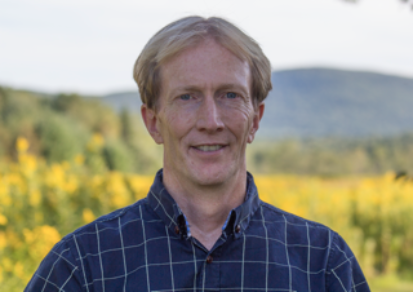Spotlight on Chris Coggins, Faculty in Geography and Asian Studies

Simon’s Rock Professor of Geography and Asian Studies Chris Coggins’ latest book, Sacred Forests of Asia: Spiritual Ecology and the Politics of Nature Conservation, has recently been published in a paperback version.
Originally published in May 2022, the book presents a thorough examination of the titular sacred forests of Asia and encourages dialogue on the nature of sacred space, place, landscape, and ecology.
“This book project came into my life as a wonderful surprise, one that I have found deeply meaningful and rewarding. I had long dreamt of a comparative study of sacred forests around the world, but I did not have the time to pursue a project of such scale,” said Coggins.
Coggins has been studying village fengshui forests in southern China since the 1990s, and forests associated with sacred mountains and water spirits in Tibetan villages since 2004, earning him a deep familiarity with the typical locations of sacred groves and woodlands in a variety of sociocultural and physical settings.
“Still, I had no idea that I would have the opportunity to work with Asian, European, and American field researchers on the first systematic comparison of sacred forests in South, East, and Southeast Asia, an enormous region of extremely high cultural and biological diversity,” said Coggins.
The opportunity to embark on this project arrived in 2017, when Prasenjit Duara, the Oscar Tang Family Distinguished Professor in History at Duke University, asked Coggins to apply to lead a workshop in the Sixth Annual InterAsian Conference at Hanoi, Vietnam in 2018, an event that had been sponsored by the Social Science Research Council and the Vietnamese Academy of Social Sciences. Successful applicants were funded to convene teams of up to ten scholars from all over Asia on a project that pursued a theme common to many Asian countries either due to cultural diffusion or in a cross-cutting sense that engenders new analytical perspectives.
“Following this invitation,” said Coggins, “I immediately contacted Professor Bixia Chen, in the School of Agriculture at the University of the Ryukyus in Okinawa Japan.”
Chen accepted the invitation, she and Coggins won the grant, and the pair immediately sent out a call for applications for participation in the Hanoi workshop.
“We received several wonderful applications and the competition was fierce. We selected researchers whose work had a strong empirical field component and whose theoretical perspective was sufficiently interdisciplinary (and even transdisciplinary) to engage with the complicated intersectional questions that form the heart of the project,” said Coggins.
For those who have not read the book, Coggins says, “Expect to find three section introductions (one for each region) that provide a concise history of humans and forests in each region. The 16 chapters of the book include work on ten countries ranging from Pakistan in the west, to Korea and Japan in the East, and south to Indonesia. We engage with forests and the socio-ecological dimensions of sacred space in terms of their political, economic, ecological, and cosmological dimensions. Our historical timeline spans the human-forest relations of pre-state, pre-imperial societies, those of early states, the effects of European colonialism, and post-colonial era approaches to conservation.”
The book can be purchased here with a discount passcode.